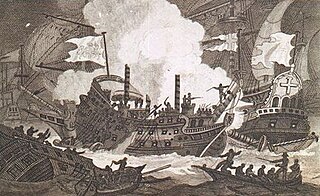Related Research Articles

1640 (MDCXL) was a leap year starting on Sunday of the Gregorian calendar and a leap year starting on Wednesday of the Julian calendar, the 1640th year of the Common Era (CE) and Anno Domini (AD) designations, the 640th year of the 2nd millennium, the 40th year of the 17th century, and the 1st year of the 1640s decade. As of the start of 1640, the Gregorian calendar was 10 days ahead of the Julian calendar, which remained in localized use until 1923.

Year 1577 (MDLXXVII) was a common year starting on Tuesday of the Julian calendar.

The Count of Monte Cristo is an adventure novel written by French author Alexandre Dumas (père) completed in 1844. It is one of the author's most popular works, along with The Three Musketeers. Like many of his novels, it was expanded from plot outlines suggested by his collaborating ghostwriter Auguste Maquet.
This article contains information about the literary events and publications of 1641.
This article contains information about the literary events and publications of 1607.
The year 1830 in science and technology involved some significant events, listed below.
The year 1788 in science and technology involved some significant events.
The year 1654 in science and technology involved some significant events.
The year 1657 in science and technology involved some significant events.
The year 1607 in science and technology involved some significant events.

Revenge was an English race-built galleon of 46 guns, built in 1577 and captured by the Spanish in 1591, sinking soon afterwards. She was the first of 13 English and Royal Navy ships to bear the name.

Guidobaldo del Monte, Marquis del Monte, was an Italian mathematician, philosopher and astronomer of the 16th century.

Achilles Pirmin Gasser was a German physician and astrologer. He is now known as a well-connected humanistic scholar, and supporter of both Copernicus and Rheticus.

Mineral del Monte, commonly called Real del Monte or El Real, is a small mining town, and one of the 84 municipalities of Hidalgo, in the State of Hidalgo in east-central Mexico.

The Great Comet of 1577 is a non-periodic comet that passed close to Earth with first observation being possible in Peru on November 1 1577. Final observation was made on January 26, 1578. The comet's official designation is C/1577 V1. Tycho Brahe was one the most distinguished observers of this comet, making thousands of precise measurements about it. The observations made by Brahe led him to believe the comet was outside of the orbit of the sun and moon. There were many independent observers of the comet from across the world. Many had different explanations for the comet. Some, such as Sultan Murad III, saw the comet as an evil omen. Others took a scientific approach, like Michael Mästlin who used the comet to fill gaps in Copernicus's model of the universe. It inspired artists, like Jiri Dschitzky, who made an engraving of the comet as it passed over Prague. Currently, using JPL Horizons, it is believed that the comet is 324 AU from the sun.

Johannes Baptista Montanus is the Latinized name of Giovanni Battista Monte, or Gian Battista da Monte, one of the leading Renaissance humanist physicians of Italy. Montanus promoted the revival of Greek medical texts and practice, producing revisions of Galen as well as of Islamic medical texts by Rhazes and Avicenna. He was himself a medical writer and was regarded as a second Galen.
Nationality words link to articles with information on the nation's poetry or literature.

The great comet of 1472 was visible from Christmas Day 1471 to 1 March 1472, for a total of 59 days. The comet passed 0.07 AU from Earth on 22 January 1472, closer than any other great comet in modern times.
del Monte is a topographic byname/surname literally meaning "from the mountains/mountain".. Notable people with the name include:

Girolamo Vivaldi was the 61st Doge of the Republic of Genoa.
References
- ↑ "The comet of 1577". Archived from the original on 29 April 2007. Retrieved 2007-03-25.
- ↑ Barratt, John (2001). "The Revenge". MilitaryHistoryOnline. Retrieved 2011-08-08.